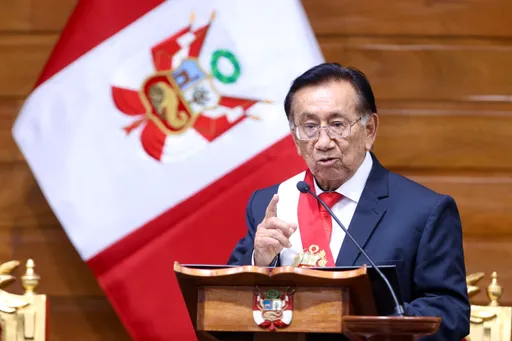Palestinian President Mahmoud Abbas called US President Donald Trump's Middle East plan the "slap of the century" on Tuesday as thousands of Palestinians held protests in Gaza and the occupied West Bank.
Hamas, which governs Gaza, said it would confront Trump's "aggressive" proposals and accused him of talking "nonsense" about Jerusalem.
Trump's controversial plan envisions a disjointed Palestinian state that turns over key parts of the occupied West Bank to Israel. It sides with Israel on key contentious issues that have bedevilled past peace efforts, including borders and the status of Jerusalem and illegal Jewish settlements, and attaches nearly impossible conditions for granting the Palestinians their hoped-for state.
"I say to Trump and (Israeli Prime Minister Benjamin) Netanyahu: Jerusalem is not for sale, all our rights are not for sale and are not for a bargain. And your deal, the conspiracy, will not pass," Abbas said during a meeting of the Palestinian leadership in Ramallah in the occupied West Bank.
Abbas said it was "impossible for any Palestinian, Arab, Muslim or Christian child to accept" a state without Jerusalem. Israel captured the eastern part of the city along with the West Bank and Gaza in a 1967 war.
Abbas stated that the Palestinian leadership meeting witnessed the participation of all Palestinian factions, including Hamas and Islamic Jihad.
"The head of the Hamas political bureau, Ismail Haniyeh, called me, and we both agreed to open a new page and hold a meeting in Gaza," Abbas said, without elaborating.
The Palestinians would only accept negotiations based on international law and supported by UN Security Council resolutions, Abbas said, whose Palestinian Authority has limited self-rule in parts of the occupied West Bank.
'A lot of anger'
The plan proposes setting up a Palestinian capital in the urban sprawl to the north and east of a concrete wall that Israel built through East Jerusalem more than a decade ago, during the last Palestinian uprising.
"This physical barrier should remain in place and should serve as a border between the capitals of the two parties," the document says.
Hamas, whose stronghold is in Gaza, was scathing.
"Trump's statement is aggressive and it will spark a lot of anger," Hamas official Sami Abu Zuhri said.
"Trump's statement about Jerusalem is nonsense and Jerusalem will always be a land for the Palestinians ... the Palestinians will confront this deal and Jerusalem will remain a Palestinian land," Abu Zuhri added.
'Trump is a fool'
In Gaza City, Palestinians burned tyres and chanted: "Trump is a fool".
"We came here to reject this deal, the American deal of shame. The US is responsible for all destruction in the Arab world," said Tamer al Madhoun, a protester.
The #FreePalestine hashtag also quickly became the top world trend on Twitter.
Warning of "widespread calls for demonstrations", the US Embassy in Jerusalem moved to restrict government employees and their families from travelling to much of Jerusalem's Old City, which sits in the city's east, as well as several Palestinian cities and areas of the occupied West Bank.
International law views the West Bank and East Jerusalem as "occupied territories" and considers all Jewish settlement-building activity there illegal.
Trump plan offers everything the far-right Israelis have been demanding, giving Palestinians nothing but vague economic promises and the tiniest glimmer of hope for statehood.
Trump tied Palestinian statehood to "firm rejection of terrorism" while Netanyahu listed a number of impossible criteria such as disarming Hamas, demilitarising Gaza, recognising the Jewish state and Jewish sovereignty over Jerusalem, Judea, Samaria, Jordan Valley, and other strategic areas in order for negotiations on statehood to even start with Palestinians.
Roughly 650,000 Israeli Jews currently live on more than 100 illegal settlements built since 1967, when Israel occupied the West Bank and East Jerusalem.
Arab backers of Trump's plan
Despite the Palestinian rejection, Trump's plan enjoyed an upbeat reception from several US allies in the Arab world, which have found common cause with Trump and Netanyahu in their opposition to Iran.
The ambassadors of Bahrain, Oman, and the United Arab Emirates –– none of which recognise Israel –– attended the announcement by Trump and Netanyahu.
Egypt, the first Arab state to make peace with Israel, encouraged the Palestinians to "undertake a careful and thorough examination" of the proposal.
Saudi Arabia lauded the Trump administration's plan even as King Salman reassured Abbas of the kingdom's commitment to Palestinians.























